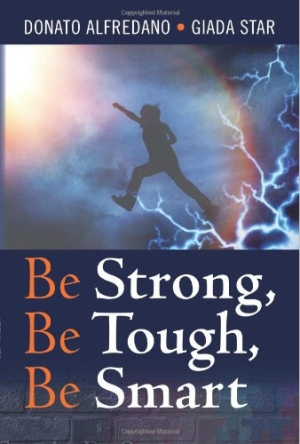Be Strong, Be Tough, Be Smart
Personal stories and thoughtful analysis help families cope with the day-to-day life of parenting a child with autism.
What good is common sense if your situation is uncommon? That’s the question Donato Alfredano kept asking when his son, Denny, was diagnosed with autism. In his engaging memoir, Be Strong, Be Tough, Be Smart, Alfredano shares the unconventional teaching methods he developed as a parent navigating the relatively uncharted waters of autism in the 1980s.
It’s hard to imagine now, when the incidence of autism spectrum disorder has risen to one in sixty-eight children, according to the CDC’s Autism and Developmental Disabilities Monitoring Network, but not so long ago, the average parent hadn’t even heard of the disorder. Alfredano effectively takes readers back to his son’s diagnosis in 1983. He writes that while he was glad to have his own observations about Denny’s differences confirmed, hearing the diagnosis did little to prepare him for the struggles in the years ahead.
Undaunted, Alfredano studied his child with analytical intensity and soon learned to harness Denny’s need for repetition and ritual to draw him into previously unexplored territory. He chronicles this journey in a series of log entries that have the unique ability of a diary to create a vivid picture of daily life. When he writes about the months of walks in the woods with Denny, for instance, where he would describe the maple trees each time as though following a script, Alfredano captures a rich snapshot of their days together.
He’s not just writing about idyllic parent-child moments, however. Alfredano uses the stories to show the unique way he encouraged Denny to learn new things. What Alfredano did after he established the comfortable ritual of walking and talking was unusual: one day, he withheld his commentary. While predictably agitated, Denny found himself filling in Dad’s part and explaining the changing leaves to his father, opening up a whole new world of verbal communication. Parents reading this and similar moments from Denny’s childhood will be moved to both tears and cheers.
Alfredano’s message—persevere, for there are rewards!—is strongest in the log entries that cover everything from Denny’s special bond with his grandfather to his first days in college. Between the journal items, Alfredano’s writing leaves out some of the more difficult details that would render him more three-dimensional. For instance, Alfredano writes that he “made lots of mistakes and some very bad decisions” without addressing what some of those mistakes and decisions might have been. There’s room for expansion in this fairly short book, and a closer look at Alfredano’s own journey would be an engaging addition.
Parents who come across Alfredano’s book might not realize it’s about autism from the title and cover. The title reflects Alfredano’s advice to himself, his son, and other parents, but it doesn’t actually explain that the volume is a memoir that parents of children with autism might find useful. This lack, along with occasional typographical errors, may keep the book from reaching a wider audience.
Overall, Alfredano’s message comes through loud and clear. His tenacious attitude has led his family to many unexpected successes, and Be Strong, Be Tough, Be Smart offers a realistic ray of hope to other families facing similar struggles.
Reviewed by
Sheila M. Trask
Disclosure: This article is not an endorsement, but a review. The publisher of this book provided free copies of the book and paid a small fee to have their book reviewed by a professional reviewer. Foreword Reviews and Clarion Reviews make no guarantee that the publisher will receive a positive review. Foreword Magazine, Inc. is disclosing this in accordance with the Federal Trade Commission’s 16 CFR, Part 255.

